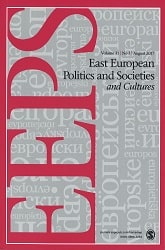The Economic Causes of New State Formation During Transition
The Economic Causes of New State Formation During Transition
Author(s): Ivo BićanićSubject(s): Economic history, Political history, Government/Political systems, Political economy, Economic development, Period(s) of Nation Building, Post-Communist Transformation
Published by: SAGE Publications Ltd
Keywords: Postcommunist transition; post-socialist development; Czechoslovakia's dissolution; Soviet Union's disintegration; breakup of Yugoslavia; successor states; economies in transition; new economies;
Summary/Abstract: Since the transition to post-socialist development started in 1989 all three federations established after the First World War have broken up (two for the second time). The three breakups spawned twenty-two new national economies, as Czechoslovakia's dissolution led to two, the Soviet Union's disintegration to fifteen, and Yugoslavia's decomposition to five successor states. As a result, of the twenty-seven East European and Central Asian economies in transition, twenty-two are new ones. This makes the "typical" economy in transition a new national economy. [...]
Journal: East European Politics and Societies
- Issue Year: 09/1995
- Issue No: 01
- Page Range: 2-21
- Page Count: 20
- Language: English
- Content File-PDF

